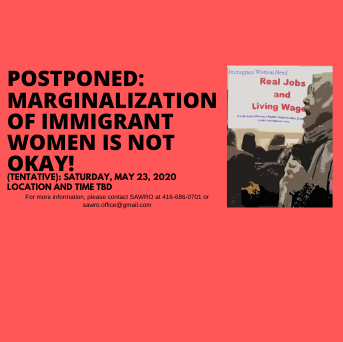The
experience of other countries during the covid-19 pandemic has made very clear
what government response should be:
- organize mandatory and comprehensive
containment and isolation measures;
- facilitate compliance by providing
universal livelihood supports to all working people.
In Canada governments at all levels are not
following this universal approach. Instead they have been rolling out a
patchwork of half-measures full of gaps. When people fall through the cracks in
this system, the coronavirus also falls through enabling it to spread and cause
greater harm.
This
analysis is based on the hundreds of phone/email contacts SAWRO workers have
made with the community’s families over the past few days. People feel their families are being left to
fend for themselves in the covid-19 crisis. They are excluded by the narrowness
and shallowness of both government health security measures and economic
security programs.
This
exclusion is a result of government failing to take into account of the
situation of workers in the low-paid precarious job sectors where many
community people—especially immigrant women—are working. Government is neither recognizing nor
responding to the vulnerabilities of workers employed through precarious work
arrangements. People facing great health security challenges and severe threat
to their livelihoods are being given very little support.
The failure
of government to organize mandatory and comprehensive covid-19 containment and
isolation measures has resulted in exposure of precarious workers at their
workplaces and on public transit commuting to work. In Ontario the government
list of “essential businesses” is far too expansive and the regulation of workplace protections far
too voluntary. They leave employers in many non-crucial enterprises to do as
they please.
Numerous
reports have been received about predatory employers refusing to follow social
distancing and hygiene protocols in the workplace and to provide required
personal protective equipment. They are also bullying and intimidating workers
who request leave to self-isolate, to care for school age children or to care
for seniors. Employers are threatening to manipulate worker access to EI or
Canada Emergency Relief Benefit if they leave the job.
Individual
workers with insecure employment relationships have difficulty taking
protective action—government action is needed:
- the number of businesses declared “essential”
should be severely restricted to enterprises with crucial pandemic response
roles
- for crucial workplaces which remain
open, mandatory protective health measures should be established and robustly
enforced
- power to decide who should have
leave from work to self-isolate, care for young children or other family
members should be taken entirely out of the hands of employers
- transportation to work for crucial
workers—which is compliant with social distancing guidelines—must be provided
A similar,
more universal approach needs to be taken in government covid-19 emergency
livelihood supports. Many community
people are fully attached to the work force and are losing earned income as
result of the pandemic but are excluded from both extended EI benefits and the
Canada Emergency Relief Benefit (CERB) program. The only employment available
to them are jobs as staffing agency workers, as on call workers, as irregularly
scheduled workers in retail and fast food and as misclassified “independent”
contractors. Because of their insecure employment, low wages and irregular
income they cannot meet the eligibility criteria of these programs—despite the devastating
impact the pandemic is having on their earned incomes.
The
exclusionary criteria affecting community working people, especially immigrant
women include:
- $5,000 minimum earning requirement
for CERB payments
- requirement that no income is
received in qualifying periods
- requirement that applicant was not
unemployed at time of pandemic outbreak
- exclusion for voluntarily leaving
employment
There are
multiple ways precariously employed workers can be entangled in these exclusions
and not receive emergency benefits. They are left scrambling around looking for
work and being forced to accept work in unhealthy situations—instead of
focussing on complying with emergency health measures.
The only solution to this problem is government providing livelihood support payments universally available to all working people, regardless of their labour market position. This approach would recognize and respond to the vulnerabilities of precariously employed workers. It would also recognize that during the pandemic crisis ensuring the health and economic security of each individual is necessary for the health and economic security of all.















